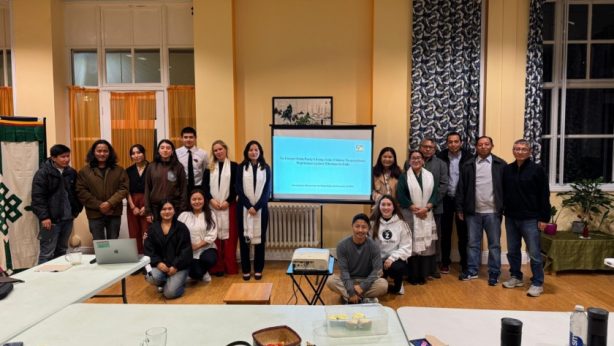Renowned Tibetan writer and intellectual, Rongwo Gendun Lhundup released from Chinese prison but remains under strict surveillance
On 9 November, a respected Tibetan writer and intellectual, Rongwo Gendun Lhundup was released from a Chinese prison. While Tibetan writers, artists, intellectuals, and activists inside and outside Tibet celebrated his release on social media, the reality remains grim. Like all former Tibetan political prisoners convicted on trumped-up charges, Rongwo Gendun Lhundup, despite being released, is placed under heavy surveillance and restrictions.
Born in 1974 to a nomadic family in Rebkong (Ch: Tongren) City, Malho (Ch: Huangnan) Tibetan Autonomous Prefecture, Qinghai Province, Rongwo Gendun Lhundup embraced monastic life at a young age. He began his studies at Darzing Monastery before continuing at Rongwo Monastery in Rebkong, Labrang Tashi Kyil, and Serta Larung. He served as a teacher alongside his academic pursuits, nurturing countless monastic and lay students.
Rongwo Gendun Lhundup has been a dedicated educator for over two decades, mentoring nearly a thousand students while contributing to preserving and promoting Tibetan literature and culture. With the rise of the internet, he became a widely recognised blogger, poet, and cultural critic, writing under various pen names such as ‘Za’ (Planet/Celestial Body), ‘Ge Nyon’ (Mad Monk), and ‘Lham Kog’ (Shoe). His literary contributions, spanning creative writing, editing, and teaching, established him as a pivotal figure in modern Tibetan intellectual discourse. However, his visibility and influence also made him a target of the Chinese authorities, resulting in repeated interrogations and detentions.
On 2 December 2020, Rongwo Gendun Lhundup was detained by Chinese authorities. A year later, on December 2021, the Xining Intermediate People’s Court sentenced him to four years in prison on charges of “inciting separatism” coupled with two additional years of deprivation of political rights, reflecting the ongoing criminalisation of Tibetan intellectuals who challenge oppressive policies and advocate for the preservation of Tibetan identity and culture.
On 6 June 2013, in honour of His Holiness the Dalai Lama’s birthday, Rongwo Gendun Lhundup composed a poem titled “O Noble One of the Pig Year, I Ask of You,” dedicated to His Holiness the Dalai Lama, born in the Pig Year of 1935 according to the Tibetan horoscope.
Brimming with longing, joy, and sorrow, the poem evoked the sacred bond between a guru, His Holiness the Dalai Lama and his disciples, Tibetans inside Tibet waiting for his return.
O One Born in the Pig Year, I Ask You
Rongwo Gendun Lhundup
O One Born in the Pig Year, I Ask You
Where is your homeland?
Where is your palace?
We whisk the dust from your golden yellow throne,
with trembling hands.
When might you,
With your white hair, swaying with compassion,
With your white smile moved by sorrow,
When will you return, riding a white cloud?
O One Born in the Pig Year, I Ask You,
Wherever you may emerge,
Please save my people,
Please save my culture and religion.
With bent knees and swaying head,
Containing all sorrows within,
Sometimes releasing cold, long breaths,
Fingers pressed to heart,
Lifting your seventy-year-old body with force,
Heedless of day and night, summer and winter,
We have watched you journey on.
We too, with bowed heads,
In a manner unseen by others,
Are praying for your long life.
Literary journey from Rebkong to national recognition
In 1990, he and his friend Tse Mindrol and other writers published the first private journal called ‘Ser Zam’ (Golden Bridge) in Rebkong. This was among the first private journals in the Tibetan region. Around that time, he and his friend, the poet Tse Mindrol, also published two poetry collections under the joint title ‘Drong Yak Ki Hurdra’ (The Roar of the Wild Yak) Within this collection, his writing was titled ‘Kangling Kyawo’ (The Gray Kangling.) Kangling is a Tibetan word for a trumpet or horn made out of a human tibia or femur, and it is used in Tibetan Buddhism for various chöd rituals and funerals performed by a chöpa. The two illustrated poetry volumes became a topic of widespread discussion. In particular, a romantically written poem in the book beautifully documenting his journey to Serta was highly appreciated by everyone for both its easy comprehension and perfect poetic qualities.
He published ‘Lha Chenpoi Nyenngag’ (The Poetry of the Great Deity), a category of high brow Tibetan poetry. When the ‘Jang Lung’ (The Ancient Green Breeze) Newspaper interviewed Rongwo Gendun Lhundup, he mentioned that his second poetry collection should be considered more like a practice rather than a turning point in poetry for which he was being credited with.
In contrast, his new poetry collection ‘Trengwa Nakpo’ (The Black Rosary) consisted of forty-one poems written over nearly a decade of experimenting with a new style of poetry writing. Between ‘The Poetry of the Great Deity’ and ‘The Black Rosary,’ Rongwo Gendun considers ‘The Black Rosary’ a better poetic achievement.
On 26 October 2009, his poem ‘Gom Shey’ (Meditation Song) won China’s second National Snow Ornament Literary Award. Later, he published a poetry collection titled ‘Mitsey Yangta’, (The Melody Horse of Life), mainly consisting of metered poetry.
Subsequently, he published ‘Lekpham Karpo’ (The White Volume) and ‘Khorwa’, (Samsara.) Before his arrest, he wrote and published a serial novel called ‘Drawai Zintho’ (Monk’s Diary) online. On 30 December 2019, ‘Monk’s Diary’ won one of China’s major National Ethnic Literary Awards, although it is currently deleted and censored online.
An author called ‘Lham Kog’ (Shoe) wrote many influential articles on the largest Tibetan blogs and most popular websites. During this period, literary circles and enthusiasts were trying to determine who ‘Lham Kog’ was. Only later was it confirmed that he was the famous writer Rongwo Gedun Lhundrub from Rebkong, Amdo.
On 19 November 2024, he published a poem titled ‘Shipar Gyurchig’ (May It Be Auspicious) online, and many Tibetans who admire him are sharing it through social media. His published works include six volumes of poetry: ‘The Gray Kangling,’ ‘The Poetry of the Great Deity,’ ‘The Black Rosary,’ ‘The Melody Horse of Life,’ ‘The White Volume,’ and ‘Samsara.’ There is also gossip in the literary circles that he has several other books in different genres, such as fiction and essays, but these have not yet been published.
The release of Rongwo Gendun Lhundup is a reminder of the many Tibetan writers and intellectuals suffering detention and persecution under China’s oppressive cultural assimilation policies. China must uphold the purported promises of free speech its constitution Article 35 and immediately put a stop to its draconian control over information, stifling fundamental right to freedom of expression and dissent through harsh regulations, often leading to imprisonment and torture.
The systemic repression and malpractices of the Chinese state not only strips Tibetans of their voices but also forcibly suppresses independent publications through widespread censorship.
Rongwo Gendun Lhundup must be allowed to live freely without surveillance or harassment. This fundamental right has been denied to others, such as Tashi Wangchuk, who, despite his initial release, faced surveillance, beatings, only to be imprisoned again. The same fate must not befall Rongwo. His freedom, and the freedom of all Tibetans, must be safeguarded.


